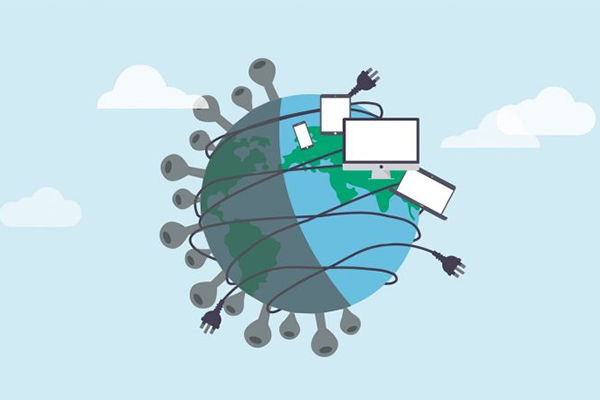Revealing the hidden pandemic: the impact of COVID-19 on the e-waste crisis

The e-waste concern had reached crisis-point long before the coronavirus struck. But as the pandemic has made us more dependent on technology than ever before, how will this impact the already rising e-waste figures? And what can we do to stop our tech habit from harming our ecosystem further?
Electronic waste (e-waste) has been a global crisis long before the coronavirus struck. It’s one of the fastest growing waste streams in the world, and contains all manner of toxic, and hazardous materials that have serious, negative consequences on our health and the environment when not disposed of responsibly.
In 2014, it’s estimated that 44.4 million metric tonnes of e-waste was generated. According to the UN’s Global E-Waste Monitor 2020, this figure rose by 21% in just 5 years, reaching 53.6 million in 2019. Sadly, just 17.4% was documented to be collected and correctly recycled. This demonstrates that collectively, the world is aiding a 4% rise in e-waste every year. Based on these findings, report predicts that by 2030, this will have further increased to nearly 75 million metric tonnes. This is an almost incomprehensible amount of harmful waste.
However, this 10-year projection does not consider the impacts of the ongoing pandemic.
A tech-centric society
The world is more connected than ever. Technology is emerging and maturing, faster than ever. Every day, more people are participating in the digital economy, and benefiting from the opportunities it creates, placing technology at the centre of nearly everything we do.
The consumption rate of electronic devices is rising every year; at an individual, household, and organisational level. At the same time, we are keeping these items for shorter timeframes than before, as disposable incomes are growing, technology is becoming more affordable, and people are choosing to replace rather than repair. Alongside urbanisation and industrialisation, these are key factors contributing to the rapid increase in e-waste. And then along came COVID-19.
Tech-centric becomes tech-reliant
When COVID-19 hit, remote working skyrocketed, and with it, so did the demand for tech. Social distancing and lockdown, meant everything, and everyone turned to technology.
Organisations rushed to deploy an abundance of new equipment to enable their employees to work from home. Schools sought after digital platforms and devices to facilitate distance learning. Families and friends turned to apps on their smart devices to stay connected to one another. Ironically, sourcing new technology became one of the top priorities to keep people safe, distanced and protected.
However, this has led to commentary from some that the pandemic could create a tidal wave of e-waste in the future. This huge influx of new technology eventually will have to be disposed of; whether that’s in 2, 5, or 10 years. And this is in addition to the significant e-waste figure that has been projected.
What happens next
It’s critical we take action before it’s too late. As a global community, its vital we move away from the throwaway culture, and look to extend lifecycles, refurbish and re-use where we can, before opting for the latest upgrade. Take laptops as an example – it’s estimated 160,000 are sent to landfill every day – and that’s just in Europe. Yet nearly 3 quarters of these could be refurbished and reused, while much of the remaining 25% could be used for new parts and recycled in a sustainable way.
Recycling, refurbishing, and reusing drives the circular economy. This circular, 360° approach is far more sustainable and less damaging to our ecosystem. It also helps to reduce the demand for new technology, which in turn lowers the amount of new tech produced. This is beneficial as the production of electricals is an incredibly environmentally harmful and resource intense process.
Recycling your e-waste can also help your play your part in achieving a carbon neutral climate. Research has found that the UK alone could save 2.8 million tonnes of CO2 emission if we were to responsibly dispose of or recycle our unwanted small electricals instead of throwing them away or keep them in storage – that’s the equivalent to taking 1.3 million cars off the road.
If we don’t act soon, the damage will be irreversible.
To find out more about recycling your old IT with Stone or for information on our secure and fully accredited IT Asset Disposal facility, contact us today.






